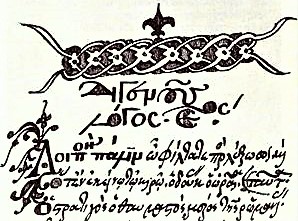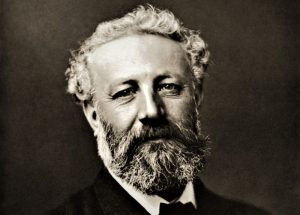Greek literature
In world literature history, Greek literature marks a great influence on the western world, serving as a starting point for the development of literary genres and themes that form part of western literature. The literary genres developed in Greek literature have left in humanity many works that have lasted in time for their form and content; and that have served as inspiration for future writers.
What is Greek literature?
Greek literature is the compendium of literary works produced by Ancient or Classical Greece, from 300 B.C. to the 4th century A.D., and which brings together the traditions, ways of thinking and histories that influenced Western culture. It can be studied in four periods or stages: the archaic stage, the classical stage, the Hellenistic stage and the Greco-Roman stage. Greek literature was the first to develop literary genres (epic, lyrical and dramatic) in the Western world.
Characteristics of Greek literature
Among the most outstanding characteristics of Greek literature we can mention the following:
- It originates in Greece 300 years before Christ.
- It is made up of four stages: archaic, classical, Hellenistic and Greco-Roman.
- The poetic genre can be divided into two:
Epic poetry (used to narrate epics and tales of wars or heroic adventures)
Lyric poetry (used for singing and dancing. This could be popular or cultured).
- The dramatic genres developed in Greek literature were: tragedy, comedy and satire.
- The use of prose was present in texts that came from politics or oratory.
- The first works of Greek literature were transmitted orally.
- Mythology and religious content were always present in the Greek theme, as was the theme of destiny.
Historical context of Greek literature
As antecedents of the Greek literature we can emphasize that Greece was not yet conformed as a nation. Its most important cities were Athens as an intellectual center and Sparta as a warrior kingdom.
From the 3rd century B.C. to the 5th century A.D. Greece developed its oral language, philosophical thought, politics and oratory through its literature and the creation of literary genres in which the most representative subjects of Western thought were dealt with.
Periods
Greek literature developed in three stages. These are: the archaic period, the classical period and the Hellenistic and Greco-Roman period.
The archaic epoch
At this stage of Greek literature, writing was not yet developed, and stories were transmitted orally. The subjects were myths, religious speculations and others related to culture. To this period belong the epics sung by Homer, known as the Iliad and the Odyssey. Tragedy and comedy were also born in Greece during this period.
The classical period
In this period the issues of truth and morality are raised in argumentative, rhetorical and oratorical genres, all of this developed in the field of philosophy and politics. Among the most important representatives of this moment, we can mention Plato and Aristotle with their classical works that have been part of Western thought for many centuries.
The Hellenistic and Greco-Roman period
At this time, Greek literature underwent certain transformations because Greek as a language became the national language of Macedonians and the territories of Alexander the Great’s empire. In this context, Greek literature changed from a popular public to a private, select and erudite one, where the center of the world is Rome until Constantinople became the capital of the Byzantine Empire.
Topics
The subjects touched upon in Greek literature were related to the Greek gods linked to fatum or destiny; philosophy linked to morality and reason; and politics.
In epic lyric, the themes were related to Greek heroes, their battles and their relationship with the Gods.
Lyric poetry was related to soul feelings and intimate emotions.
In theater, the themes were focused on great human passions and everyday life.
Genres
The literary genres used in classical Greek literature were epic poetry, lyric poetry and theatre. They also developed oratory.
In Greek epic poetry, the Iliad and Homer’s Odyssey stand out as classics of this genre. These works are known as epics because they sing the exploits of Greek heroes.
In lyric poetry, sentimental and emotional themes. These could be performed by a soloist or by a choir. Representatives of this genre are Anacreontic, Safo and Pindaron, among others.
In theater, Greeks had two types of dramatic works, comedies and tragedies. Through this genre, it was sought that the spectator reflect and have fun with common life elements and with the virtues and vices of man in front of his destiny. The best-known playwrights of the Greek classical period are Aeschylus, Sophocles and Euripides.
Importance of Greek literature
Greek literature is important because it was the first to stand out in European history and was the generator of literary genres that have served as models for other countries.
Just as the aesthetics and arts of the West originated in Classical Greece, Greek literature gave rise to the great ideas of humanity and the questions of man and the role he plays in the world, life, death, its virtues, its vices, its pleasures and torments.
Representatives
Of the most outstanding representatives of Greek literature we can mention the following:
- In epic poems:
- Homer: Rhapsody to whom are attributed the epic poems of the “Iliad and the Odyssey; stories that tell of Achilles’ anger and Ulysses’ return to Ithaca. The Homeric hymns are also attributed to him.
- In philosophy:
- Hesiod: Greek poet and philosopher, his works are inspired by mythological characters. For many, he is known as the first Greek philosopher.
- Socrates: Greek philosopher, Plato’s master and one of the greatest representatives of Western philosophy. Socrates did not leave written works in life because he believed that each person should develop his own ideas.
- Plato: Greek philosopher, his works are part of Western classical thought. Among his best known and studied texts, we can mention the Republic.
- Aristotle: Greek philosopher, logic and scientist; his ideas are part of Western thought. He wrote more than 200 treatises on various subjects such as metaphysics, rhetoric, politics, ethics, among others. Among his most outstanding works, we can mention Metaphysics.
- In history:
- Herodotus: Historian and geographer, author of Greek cosmogony. Among his best-known works are the nine books of history.
- In lyric poetry:
- Sappho: Greek poet, also known as the tenth muse because of its importance in classical poetry. Among her best-known works is the hymn in honor of Aphrodite.
- Anacreon: Greek poet who sings the pleasures of life, love and wine. His poetry influenced poets of the Middle Ages. Among his best-known works are the poems Anacreontic.
- Pindar: Greek choral lyric poet known for his Odes in honor of the Olympic Games. It sings of the life, beauty, strength and vigor of youth.
- In the theater:
- Aeschylus: Greek playwright of tragic works, characterized by giving life to great characters and touching moral and religious themes. Among his best-known works is the trilogy Oresteia.
- Sophocles: tragic playwright created from works linked to Greek mythology and with characters who are moved by their will rather than by their destiny. Among his best-known works is Oedipus the King.
- Euripides: playwright who revolutionized the Greek tragedy with works full of realism and pessimism, with characters who rebel against the gods. Among his most outstanding works, Hippolytus can be mentioned.
Classical works of Greek literature
Of the classical works of Greek literature we can mention the following:
- The Iliad and the Odyssey, Homer.
- The Republic, Plato
- Oedipus King, Sophocles
- Rhetorical art, Aristotle
- Ode to Aphrodite and to the Beloved, Sappho
- The Nine Books of History, Herodotus
- Prometheus in chains, Aeschylus
- Medea, Euripides
How to cite this article?
Briceño V., Gabriela. (2019). Greek literature. Recovered on 23 February, 2024, de Euston96: https://www.euston96.com/en/greek-literature/










